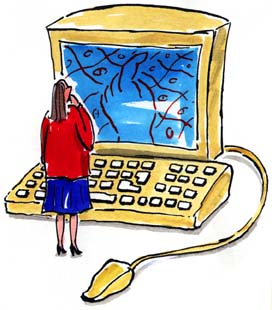 As the Internet and social media continue to transform our society, today’s youth are growing up in unchartered waters. For young people who confront problems like depression, the Internet is a particularly tricky issue to navigate.
As the Internet and social media continue to transform our society, today’s youth are growing up in unchartered waters. For young people who confront problems like depression, the Internet is a particularly tricky issue to navigate.
Now a new systematic review provides evidence on how the Internet impacts teens and young adults at risk for self-harm and suicide. (Self-harm includes behaviors that injure such as intentional cutting and burning, but is usually not intended as a suicide attempt.)
The review, conducted by researchers at Oxford University, includes 14 studies that examined Internet use by troubled teens across the globe. It found contradictory evidence on whether the internet exerted a positive or negative influence over young people at risk for dangerous behaviors.
Some studies in the review found that internet forums help to connect socially isolated people and provide support for changing behaviors. But other studies revealed that young people can learn about harmful behaviors online, and then act out what they have seen.
The review found addiction to the internet increases the risk of self-harm, depression and thoughts about suicide. Internet use is also linked with more violent methods of self-harm.
Researchers identified a strong link between young people using internet forums and an increased risk of suicide – a connection not found in youth who used social network sites like Facebook or Twitter. That’s because forums provide a level of anonymity not available on other sites, the researchers said.
Janis Whitlock is a research scientist in Cornell’s Bronfenbrenner Center for Translational Research who focuses on adolescent health and well being. She says Internet use among troubled youth is “a mixed bag.”
“There are some real benefits to being able to access information and other people that may be supportive on the web, and there are also some real risks,” she said. But positive support on the Internet is not as helpful as in-person support with a therapist, Whitlock said.
The take-home message: It’s best to carefully monitor Internet use of young people who are at risk of self-harm or suicide. Web sites and social media can provide positive support, or examples of harmful behaviors.
The review also noted that future research should include clinical assessments of the study participants and specific questions about what web sites they view. In instances where young people are at risk, more specific evidence is the best way to make sure they get the help they need.



[…] As the Internet and social media continue to transform our society, today's youth are growing up in unchartered waters. For young people who confront problems. […]